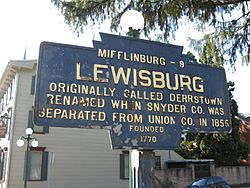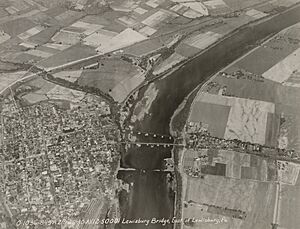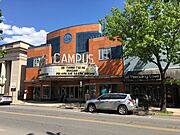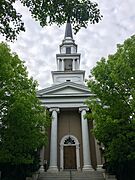Lewisburg, Pennsylvania facts for kids
Quick facts for kids
Lewisburg
|
||
|---|---|---|
|
Borough
|
||
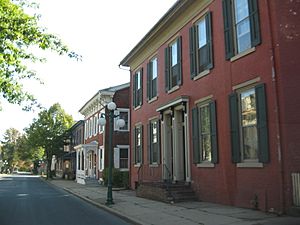
Lewisburg
|
||
|
||
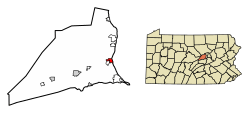
Location of Lewisburg in Union County, Pennsylvania.
|
||
| Country | United States | |
| State | Pennsylvania | |
| County | Union | |
| Settled | 1785 | |
| Incorporated (borough) | March 21, 1812 | |
| Area | ||
| • Total | 0.97 sq mi (2.52 km2) | |
| • Land | 0.97 sq mi (2.52 km2) | |
| • Water | 0.00 sq mi (0.00 km2) | |
| Population
(2020)
|
||
| • Total | 5,158 | |
| • Density | 5,301.13/sq mi (2,046.36/km2) | |
| Time zone | Eastern (EST) | |
| • Summer (DST) | EDT | |
| Zip code |
17837
|
|
| Area code(s) | 570 | |
| FIPS code | 42-42976 | |
Lewisburg is a town, also called a borough, in Union County, Pennsylvania, United States. It is about 30 kilometers (19 miles) south of Williamsport and 60 kilometers (37 miles) north of Harrisburg. In 2020, about 5,158 people lived there. Lewisburg is the main town, or county seat, of Union County.
This town is located in central Pennsylvania's Susquehanna Valley, right by the West Branch Susquehanna River. It is home to Bucknell University. The downtown area, built in the 1800s around Market Street, is a special historic place. Lewisburg is also an important part of a larger group of towns in the area.
Contents
History of Lewisburg
Lewisburg was started in 1785 by a man named Ludwig Derr. He had lived in the area since the 1760s. Derr bought large pieces of land from the William Penn family and other landowners. One of his biggest land purchases was called "The Prescott."
Ludwig Derr had a good relationship with the local Native Americans. While other settlers' homes were often attacked, Derr's lands stayed safe. In 1784, he worked with Samuel Weiser to plan out his land and create a town called Derrstown. Later, the name was changed to Lewisburgh. In 1893, the name was shortened to Lewisburg.
The names of the streets that run east-west are interesting. Streets like St. George, St. Catherine, and St. Louis might be named after saints. However, it is more likely they were named after members of Ludwig Derr's family. For example, George was his son, and Catherine was his wife. Ludwig's own name, Ludwig, is similar to Lewis or Louis. Other original street names like St. John, St. Mary, and St. Anthony might have been named after other children or friends' families.
For many years, Lewisburg has been a center for business in Union County. The West Branch Susquehanna River was used for moving logs and shipping goods. You can still see parts of old factories and stone buildings along the river. Before and during the American Civil War, many people in Lewisburg were against slavery. Several places in town were safe stops on the Underground Railroad, a secret network that helped enslaved people find freedom.
The Susquehanna River has flooded several times. Big floods happened in 1889, 1936, and 1972. After the 1972 flood, houses where Hufnagle Park is now were taken down.
Some important buildings and areas in Lewisburg are listed on the National Register of Historic Places. These include the Lewisburg Historic District, the Chamberlin Iron Front Building, the Packwood House-American Hotel, and the Reading Railroad Freight Station.
Market Street is the main road in the town.
Lewisburg's Location
Lewisburg is located at coordinates 40°57′50″N 76°53′17″W / 40.96389°N 76.88806°W.
The town covers an area of about 2.5 square kilometers (1.0 square mile). All of this area is land.
People in Lewisburg
| Historical population | |||
|---|---|---|---|
| Census | Pop. | %± | |
| 1830 | 914 | — | |
| 1850 | 2,012 | — | |
| 1860 | 2,666 | 32.5% | |
| 1870 | 3,121 | 17.1% | |
| 1880 | 3,080 | −1.3% | |
| 1890 | 3,248 | 5.5% | |
| 1900 | 3,457 | 6.4% | |
| 1910 | 3,081 | −10.9% | |
| 1920 | 3,204 | 4.0% | |
| 1930 | 3,308 | 3.2% | |
| 1940 | 3,571 | 8.0% | |
| 1950 | 5,268 | 47.5% | |
| 1960 | 5,523 | 4.8% | |
| 1970 | 6,376 | 15.4% | |
| 1980 | 5,407 | −15.2% | |
| 1990 | 5,785 | 7.0% | |
| 2000 | 5,620 | −2.9% | |
| 2010 | 5,792 | 3.1% | |
| 2020 | 5,158 | −10.9% | |
| Sources: | |||
In 2000, there were 5,620 people living in Lewisburg. About 10% of the population was under 18 years old. Many people between 18 and 24 years old lived there, likely because of Bucknell University.
Parks and Fun Places
Hufnagle Park is a great spot in the middle of downtown Lewisburg, located along Bull Run. It has open spaces, a picnic area, a playground, and pretty gardens. The park is named after Gordon Hufnagle, a public safety officer who saved lives during the Agnes Flood in 1972. A covered footbridge near the park was built in his honor in 1982.
The Lewisburg Community Garden is a project shared by Lewisburg Borough and Bucknell University. It opened in 2012. This garden teaches students and local people about gardening. It also rents out garden plots and grows thousands of pounds of organic food each year to donate to local food programs.
Other parks in Lewisburg include:
- Soldier's Memorial Park
- Mariah's Garden (both by the Susquehanna River)
- Lewisburg Area Recreation Park
- Wolfe Field
- St. Anthony Street Park
- D.F. Green Field
Famous People from Lewisburg
Many interesting people have connections to Lewisburg:
- Ward R. Bliss: He was a state representative for Pennsylvania.
- Thaddeus Mortimer Fowler: A mapmaker who lived in Lewisburg for several years.
- Jason Bohn: A professional golfer who was born in Lewisburg.
- Doug Lebda: The person who started and is the CEO of LendingTree, was born and grew up in Lewisburg.
- George H. Ramer: A U.S. Marine Corps hero who won the Medal of Honor. He went to and taught at Lewisburg High School.
- Christy Mathewson: A famous Major League Baseball player and one of the first people to be put into the National Baseball Hall of Fame and Museum. He went to Bucknell University.
- Berhanu Nega: An Ethiopian politician who taught at Bucknell University.
- Philip Roth: A well-known novelist who attended Bucknell University.
- Mary Oliver: An American poet who moved to Lewisburg in 1986 to be the "Poet in Residence."
Gallery
See also
 In Spanish: Lewisburg (Pensilvania) para niños
In Spanish: Lewisburg (Pensilvania) para niños


